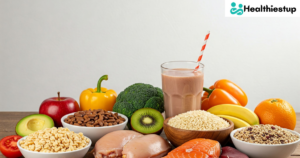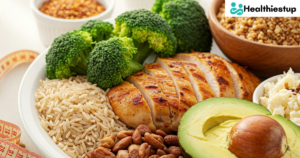Introduction
Nutrition For Weight Gain : Gaining weight in a healthy manner requires more than just consuming excess calories. Proper nutrition ensures that weight gain is balanced, leading to improved muscle mass, energy levels, and overall well-being. This article explores effective nutrition strategies, high-calorie food sources, and meal planning tips to help you gain weight safely and effectively.
Understanding nutrition for Weight Gain: The Science Behind It
Nutrition for Weight gain occurs when calorie intake exceeds calorie expenditure. However, the type of calories consumed plays a crucial role in whether weight gain is healthy or detrimental. A combination of macronutrients proteins, carbohydrates, and fats ensures muscle growth, energy, and overall bodily function.
The Role of Macronutrients
- Proteins: Essential for muscle repair and growth.
- Carbohydrates: Primary energy source for bodily functions.
- Fats: Essential for the synthesis of hormones and the long-term storage of energy.
How Many Calories Are Needed?
The number of calories required for weight gain varies based on an individual’s metabolism, age, gender, and activity level. A general guideline is to consume 500-1000 extra calories per day above the maintenance level to gain 0.5 to 1 pound per week.
Energy Balance and Metabolism
- Basal Metabolic Rate (BMR): The amount of calories burned while at rest.
- Total Daily Energy Expenditure (TDEE): The sum of the calories burned each day, including activities.
- Caloric Surplus: Consuming more calories than the TDEE leads to weight gain.
Setting Realistic Goals for Healthy Weight Gain
Aiming for a gradual increase of 0.5 to 1 pound per week is ideal to ensure muscle growth without excessive fat accumulation. Consulting a nutritionist can help determine an appropriate calorie intake based on activity levels and body type.
Factors Influencing Weight Gain
- Metabolism: Fast metabolism requires a higher calorie intake.
- Genetics: Some individuals naturally find it harder to gain weight.
- Activity Level: Higher physical activity demands more caloric intake.
High-Calorie Foods That Promote Weight Gain
Selecting nutrient-dense foods instead of empty-calorie options helps ensure optimal Weight Gain. Below are key food groups to focus on:

Protein-Rich Foods for Muscle Growth
- Lean meats (chicken, beef, turkey)
- Eggs
- Dairy products (milk, cheese, yogurt)
- Plant-based proteins (beans, lentils, tofu, quinoa)
- Protein shakes and smoothies
Healthy Carbohydrates to Increase Energy Levels
- Whole grains (oats, brown rice, quinoa)
- Starchy vegetables (potatoes, sweet potatoes, corn)
- Fruits (bananas, mangoes, dates)
- Legumes (beans, lentils, chickpeas)
Healthy Fats for Optimal Weight Gain
- Avocados
- Nuts and seeds (almonds, walnuts, sunflower seeds)
- Olive oil and coconut oil
- Fatty fish (salmon, mackerel, tuna)
- Nut butters (peanut butter, almond butter)
Effective Meal Planning nutrition for Weight Gain
A structured meal plan helps ensure consistent calorie intake. Below is a sample high-calorie meal plan:

| Meal | Food Options |
|---|---|
| Breakfast | Scrambled eggs, whole-grain toast, avocado, milk |
| Snack | Greek yogurt with nuts and honey |
| Lunch | Grilled chicken, brown rice, steamed vegetables |
| Snack | Peanut butter and banana smoothie |
| Dinner | Salmon, quinoa, roasted sweet potatoes |
| Late-Night Snack | Cottage cheese with almonds |
Meal Frequency and Portion Control
Eating 5-6 meals per day helps maintain energy levels and prevents the body from using muscle as fuel. Larger portion sizes contribute to a caloric surplus for effective weight gain.
Pre- and Post-Workout Nutrition for Weight Gain
- Pre-workout: A combination of carbohydrates and proteins (e.g., oatmeal with peanut butter)
- Post-workout: Protein and carbohydrates (e.g., protein shake with banana)
Supplements for Supporting Healthy Weight Gain
While whole foods should be prioritized, supplements can help fill gaps in the diet. Useful options include:
Common Supplements for Weight Gain
- Protein Powders: Organic or whey for rebuilding muscles.
- Mass Gainers: High-calorie supplements for individuals struggling to eat enough.
- Multivitamins: Ensure adequate nutrient intake.
- Creatine: Supports muscle growth and energy production.
- Omega-3 Fatty Acids: Lower inflammation and support general health.
Typical Errors to Steer Clear of When Attempting to Gain Weight
- Overeating Junk Food: Leads to unhealthy fat accumulation.
- Skipping Meals: Causes calorie deficits and hinders weight gain.
- Lack of Exercise: Resistance training helps convert extra calories into muscle instead of fat.
- Not Tracking Progress: Monitoring weight gain helps make necessary dietary adjustments.
- Ignoring Hydration: Water intake is essential for digestion and muscle recovery.
Conclusion
Achieving healthy nutrition for weight gain requires a balanced diet, strategic meal planning, and a focus on nutrient-dense foods. Combining proper nutrition with exercise ensures that gained weight is primarily muscle, leading to better overall health. Start implementing these nutrition tips today and track your progress for sustainable results!
By focusing on nutrition for weight gain, you can achieve your weight goals in a safe and effective manner. Whether you’re looking to build muscle, improve your energy levels, or enhance overall well-being, the right diet plays a crucial role. Stick to a high-calorie, nutrient-dense eating plan, and enjoy the benefits of a healthier, stronger body!
FAQs About Nutrition and Weight Gain
1. To gain weight, how many calories need I consume?
It depends on your metabolism and activity level, but generally, 500–1000 calories above maintenance is recommended.
2. Which beverages are ideal for gaining weight?
Smoothies, whole milk, protein shakes, and fruit juices are great high-calorie beverage options.
3. Can I gain weight without exercise?
Yes, but combining weight gain with strength training ensures healthy muscle mass instead of fat accumulation.
4. How long does it take to see results?
Typically, noticeable weight gain occurs within 4–6 weeks with consistent nutrition and meal planning.
5. Is eating late at night good for weight gain?
Yes, a high-protein, high-calorie snack before bed can support muscle repair and growth.
6. What should I not do if I want to put on weight?
Avoid processed foods, excessive sugary drinks, and relying solely on junk food for calorie intake.



